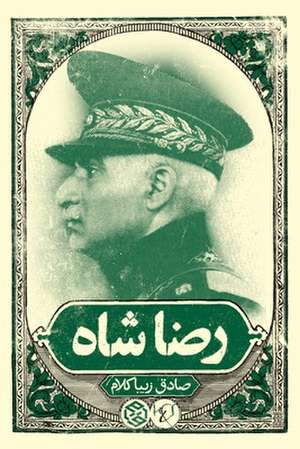Reza Shah
Autor Sadegh ZibakalamPaperback – 31 mai 2019
| Toate formatele și edițiile | Preț | Express |
|---|---|---|
| Paperback (1) | 227.27 lei 6-8 săpt. | |
| H&s Media – 31 mai 2019 | 227.27 lei 6-8 săpt. | |
| Hardback (1) | 270.65 lei 6-8 săpt. | |
| H&s Media – iun 2019 | 270.65 lei 6-8 săpt. |
Preț: 227.27 lei
Nou
Puncte Express: 341
Preț estimativ în valută:
43.52€ • 44.41$ • 36.62£
43.52€ • 44.41$ • 36.62£
Carte tipărită la comandă
Livrare economică 26 februarie-12 martie
Preluare comenzi: 021 569.72.76
Specificații
ISBN-13: 9781780837628
ISBN-10: 1780837623
Pagini: 300
Dimensiuni: 152 x 229 x 18 mm
Greutate: 0.44 kg
Editura: H&s Media
ISBN-10: 1780837623
Pagini: 300
Dimensiuni: 152 x 229 x 18 mm
Greutate: 0.44 kg
Editura: H&s Media
Notă biografică
Sadegh Zibakalam is an Iranian intellectual, academic and writer. Born in 1948 in Tehran, he studied Chemical Engineering in the UK during the 1960s and the early 1970s. Because of his activities against the Shah's regime, he was detained by the SAVAK, the Iranian secret police, while visiting Iran in 1974. He was accused of anti-state activities and was kept in prison for more than two years. After being released from prison in 1976, he was refused permission to live Iran to finish his PhD and eventually came back to the UK ten years later and studied social sciences at the School of Peace Studies at Bradford University where he was awarded a PhD in 1989. He joined Faculty of Law and Political Science at Tehran University became a professor in that Department in 2007. Zibakalam has emerged as a thinker, and many Iranians widely read his writings. He has written more than 20 books mainly on contemporary Iranian social and political issues. In many of his writings, he challenges the official interpretations. In his most famous publication," How did we become what we are" which has been reprinted 40 times and translated into Arabic, he challenges the state interpretation of the causes of ran's which blames it on Western colonialization and instead seeks it through Iran's history. Academic life hasn't been easy for Zibakalm. Two of his books, Reza Shah and The Birth of Israel were barred from publication by the authorities. He was also refused teaching at the Azad Islamic University which is run by conservative Islamic authorities. He is conversely popular in social media. His Instagram page has nearly a million followers, and 160 and 75 thousand people follow him on Twitter and Telegram, respectively. He also appears frequently on the BBC, Aljazeera, CNN and the other international media. Finally, Zibakalam has consistently defended freedom of expression, minorities' rights and political detainees. His writings on these issues often have angered the authorities in Iran charging him with anti-state propaganda. Though he hasn't been sentenced into prison, on several occasions, the court has sentenced him to fines. Because of his democratic stand on human rights issues, Professor Zibakalam was awarded the DW prize for " freedom of speech" in June 2018.
